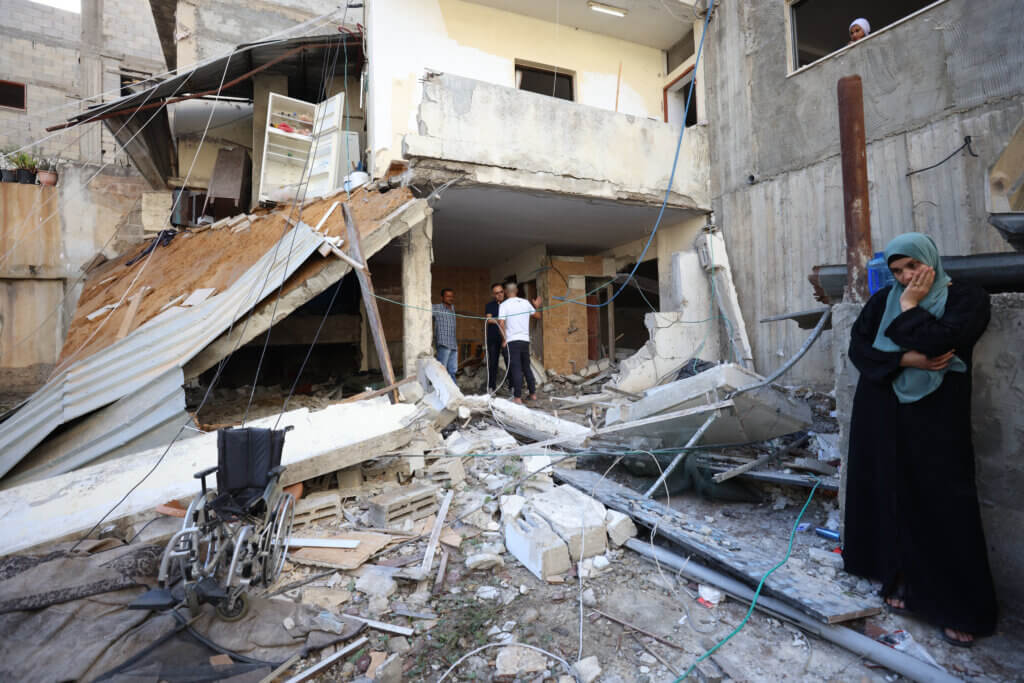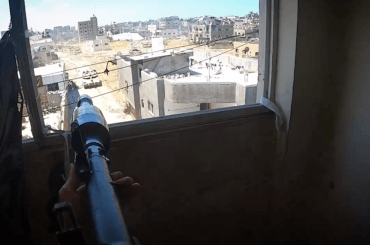Key Developments (September 21 – 25)

Israeli forces conducted a raid on Nablus, injuring over a dozen Palestinians and arresting a wanted member of the Lions’ Den resistance group. According to local reports, Israeli forces raided the Rafidia area in the heart of Nablus late Thursday night, September 21, and surrounded a home that was housing resistance fighters. Israeli forces fired live ammunition and anti-tank missiles towards the home, sparking fierce armed confrontations in the area. Israeli forces arrested Khaled Tbeileh, a member of the Nablus-based Lions’ Den, and an officer within the PA security forces. According to reports, Tbeileh had turned himself into the PA last June for so-called “protective custody,” as part of a push by the PA to weaken the resistance by offering its fighters amnesty in its jails, and safety from Israeli arrest and assassination. In reports that Mondoweiss could not independently confirm, Tbeileh was reportedly released from PA jail briefly on Thursday for a family visit, which is when Israeli forces reportedly conducted their raid and arrested him. The arrest of Tbeileh sparked a fierce response from resistance groups in the West Bank, with a number of shootings and other operations reported in the immediate aftermath of the raid.
Three Palestinians were killed over the weekend in separate Israeli raids in the West Bank. On Friday, September 22, Israeli forces raided the town of Kafr Dan west of Jenin, sparking armed confrontations with local fighters. 18-year-old Abdullah Abu Hassan was killed while confronting soldiers, the Jenin Brigade said in a statement following the killing of the teenager. Two days later, on Sunday, September 24, Israeli forces conducted a large-scale raid on the Nur Shams refugee camp in the northwestern West Bank city of Tulkarem, killing two Palestinians. The Tulkarem Brigade released a statement that its fighters were engaged in “violent and fierce clashes” with Israeli forces, using live ammunition and locally-made explosives to target the forces. Two Palestinians, identified as 21-year-old Asaad Jab’awi and 32-year-old Abdurrahman Suleiman Abu Daghash, were killed during the raid. According to reports, Jab’awi was a member of the resistance, and Daghash was a bystander who, according to his family, was shot by an Israeli sniper when he went out on his rooftop to observe the raid. During the raid, Israeli forces reportedly used projectiles and live ammunition, as well as bulldozers to dig up streets and damage infrastructure to the camp. Local resistance groups claimed that its fighters caused casualties amongst Israeli ranks, though the Israeli military did not make any statements on the matter. The army claimed that it had dismantled an “operational command center” in the camp.
Israeli settlers conducted attacks against Palestinians and their property across the occupied West Bank, including an instance in which a settler rammed a disabled Palestinian young man with a vehicle in Hebron, and settlers pepper-spraying a four-year-old in the face in Masafer Yatta. According to local media reports, an Israeli settler in the Tel Rumeida neighborhood of Hebron’s Old City, where violent extremist settlers have taken over large portions of land, rammed a vehicle into a Palestinian shop, injuring a disabled 21-year-old Palestinian man in the head. Another girl was injured in the incident as well, and both were transferred to an Israeli hospital, where their conditions were reported as moderate. In Masafer Yatta, also known as the South Hebron Hills, Israeli settlers were chasing down and harassing a group of Palestinian shepherds and their families. The settlers pepper-sprayed the Palestinians, including the son of one of the shepherds, causing the 4-year-old child to suffer burns on his face. In the Ramallah-area village of al-Mughayyir, settlers also attacked and harassed a group of shepherds, beating up two Palestinian men as they were grazing their livestock. Other similar incidents of harassment by settlers were reported in the Bethlehem and Jordan Valley areas. Israeli settler and military harassment of Palestinians, particularly in rural areas of the West Bank, is a tried and true tactic of ethnic cleansing and forced displacement in the West Bank. Earlier this year, Palestinians from the village of Ein Samiya outside of Ramallah were forced to leave their homes and village permanently due to endless settler violence and harassment.
In-Depth: The daily war of worlds
During the past week, multiple worlds collided in a continuation of what has become a daily war between them. They consist of the world created in the past two years by the rise of armed resistance in the West Bank, which rejects the reality of colonial subordination, and the world represented by the Palestinian Authority, which accepts that reality and even fights to preserve it. Between those two worlds exists another one entirely, lording over both and seeking to displace one at the expense of the other. That third world is the colonial state and its settlers — and it is characterized by the constant drive to take over land and to brutally put down any resistance to it. The strategies by which it has sought to do so have varied over the past two years, especially in light of the settler takeover of the colonial government and the assumption of hardliners like Bezalel Smotrich and Itamar Ben-Gvir of key positions of power within the Civil Administration and the Police force.
Yet despite these ruptural changes, the overall counterinsurgency strategy has been fairly consistent — to wage a protracted form of low-intensity warfare that seeks to win against the armed Palestinian resistance by attrition. It’s a policy of both slow strangulation and lightning-fast military operations that are over before they begin, meant to achieve limited tactical goals that keep the rising tide of resistance below a certain level — similar to Israel’s strategy of “mowing the lawn” with the resistance in Gaza — without completely eliminating it.
The reason why it doesn’t choose to eliminate it is because the price of doing so is too high, too risky, and too uncertain. The army fears upsetting the balance in the war between worlds, but above all of that, it is not prepared to pay the human cost that a more wide-ranging confrontation would entail — which would force its soldiers into hostile terrain that would put their lives at risk. This hesitation is made even more relevant considering the existing division within colonial society between the right and the left, in which the predominantly liberal military command does not want its soldiers to die fighting a battle of the Netanyahu government’s creation.
What this means, in effect, is that the colonial authorities are in a state of war with the insurgent world, and the intensity of that war is both daily and uninterrupted. What’s more, it embroils the local population in the daily battle to the point that the fight becomes routinized and almost mundane. This is beyond the anodyne observation that one becomes desensitized to the news of a martyr in Jenin refugee camp, or to the dozens of night arrests that occur every day — it means that this state of attack itself hardens people. By virtue of the constant low-grade exposure, they begin to gradually get pulled out of the world of the PA and into the insurgent world, and they become more used to the price they are made to pay, as a society, for resistance. This leads, paradoxically, to the formation of the beginnings of a resistance society, no matter how partial or contradictory that society remains.
The reason for that contradiction, of course, is that they also simultaneously inhabit the other world dominated by the coercive power of the PA’s authoritarian rule and the far more insidious structural forces that keep it together — something akin to “the dull compulsion of economic relations,” or rather more prosaicly, the existence of material interests not to rock the boat. The PA’s totalitarianism, which in recent weeks has expressed itself in the arrest of resistance fighters and opposition figures, discourages direct political expressions of insubordination, but the magnetic pull of the material incentives of its world is most effective in ensuring “stability.” In this way, it is constantly trying to pull Palestinian society back in, seeking to snatch it back from the state of insurgency created by the resistance.
What we have, in the end, is a war between worlds. More often than not, the nascent world of resistance fights that war on two fronts, attempting to come out on the winning side of the game of attrition — or at least in its latest round.
With these odds stacked against it, it’s a miracle that this world exists at all, let alone consistently survives the daily war’s ravages. But this can also be explained by the mere existence of the third world — the colonial world, which, being terminally committed to expanding itself through land grabs and settler pogroms, creates the reason for the existence of its opposite. In this sense, while the colonial world tries to encourage Palestinian society to accept surrender and its place of subordination within the PA’s world, its own actions create its proverbial gravediggers — or perhaps less teleologically, create the constant impetus for Palestinian society to refuse surrender and pick up the rifle.
Important Figures
- An estimated 243 Palestinians have been killed by Israel since the start of the year
- More than 730 Israeli settler attacks on Palestinians and their property have been recorded since the start of the year, according to UN documentation.
- Israeli forces have conducted more than 2,500 search and arrest raids in the West Bank in 2023


